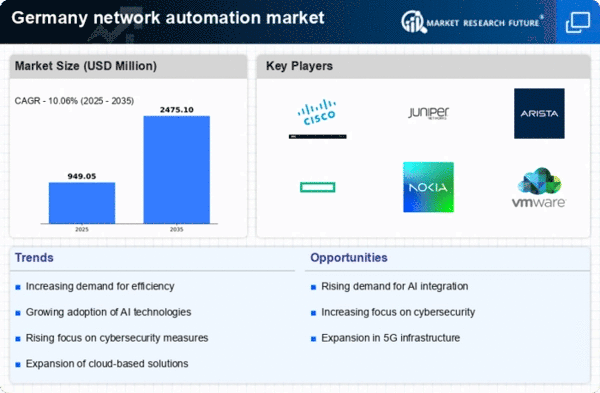Emphasis on Network Security
In the context of the network automation market, the emphasis on network security in Germany is becoming increasingly pronounced. As cyber threats evolve, organizations recognize the necessity of implementing automated security measures to protect their networks. Automation tools can enhance threat detection and response times, thereby reducing the risk of data breaches. Recent studies indicate that automated security solutions can decrease incident response times by up to 50%. This growing awareness of security vulnerabilities drives investments in network automation technologies that incorporate advanced security features. The network automation market is thus adapting to meet the rising demand for solutions that not only automate network management but also fortify security postures.
Regulatory Compliance Pressures
The network automation market in Germany is significantly influenced by regulatory compliance pressures. Organizations are increasingly required to adhere to stringent regulations regarding data protection and network management. Compliance with regulations such as the General Data Protection Regulation (GDPR) necessitates the implementation of automated solutions that ensure data integrity and security. Companies that fail to comply face substantial fines, which can reach up to €20 million or 4% of their global turnover. As a result, businesses are turning to network automation technologies to streamline compliance processes and maintain regulatory standards. The network automation market is thus witnessing a shift towards solutions that facilitate compliance while enhancing operational efficiency.
Growth of IoT and Connected Devices
The proliferation of Internet of Things (IoT) devices in Germany significantly impacts the network automation market. With millions of devices connected to networks, the complexity of managing these connections increases. Organizations are compelled to adopt automation solutions to efficiently handle the vast amount of data generated by IoT devices. It is estimated that by 2025, the number of connected devices in Germany could reach over 50 million. This growth necessitates robust network management strategies, prompting businesses to invest in automation technologies that can scale and adapt to changing demands. Consequently, the network automation market is evolving to provide solutions that ensure seamless integration and management of IoT ecosystems.
Advancements in Network Technologies
The network automation market in Germany is propelled by advancements in network technologies. Innovations such as Software-Defined Networking (SDN) and Network Functions Virtualization (NFV) are transforming how networks are designed and managed. These technologies enable greater flexibility and scalability, allowing organizations to adapt to changing business needs. The integration of AI and machine learning into these technologies further enhances automation capabilities, enabling predictive analytics and proactive network management. As organizations seek to leverage these advancements, the network automation market is poised for growth. It is anticipated that the adoption of SDN and NFV will increase by over 40% in the coming years, driving further investment in automation solutions.
Rising Demand for Operational Efficiency
The network automation market in Germany experiences a notable surge in demand for operational efficiency. Organizations are increasingly seeking to streamline their network operations, reduce manual interventions, and enhance overall productivity. This trend is driven by the need to minimize human errors and optimize resource allocation. According to recent data, companies that implement network automation solutions report a reduction in operational costs by up to 30%. As businesses strive to remain competitive, the adoption of automation technologies becomes essential. The network automation market is thus witnessing a shift towards solutions that facilitate real-time monitoring and management, enabling organizations to respond swiftly to network issues and maintain service quality.
















